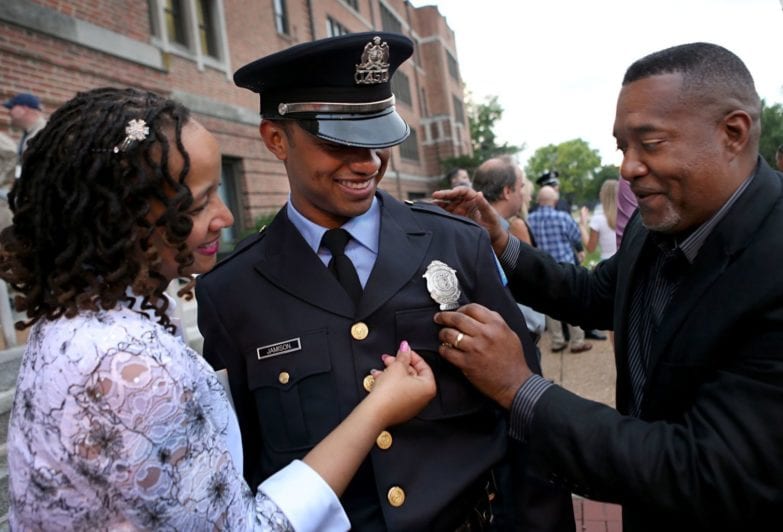For Ferguson native Christopher Jamison, living through the protests that followed the shooting death of Michael Brown on Aug. 9, 2014, was a lesson in contradictions.

St. Louis Post-Dispatch: Messenger: From Ferguson to Hodiamont, an effort in diversifying the police force reboots
Jamison is a black man who was born and raised in Ferguson and loves his hometown.
He also recognized the injustice rampant in his and other north St. Louis County communities.
As a cop.
Upon graduating from Lindenwood University in 2013, Jamison applied to be a police officer with both the city of St. Louis and St. Louis County. By 2015, he had applied three times and never made it to the academy.
Then his mom heard about something that might help.
It was the “Pre-Academy Recruitment Program” sponsored by the Ethical Society of Police, an association of police officers that often advocates for the rights of police officers of color.
The purpose of the program was to help the St. Louis region deal with one of the problems highlighted during the Ferguson unrest — that not enough police officers in the region looked like the communities they were serving.
From 2015 to 2016, the program graduated 37 students that would move on to become police officers or otherwise work in law enforcement.
Jamison was one of them.
The students learned about constitutional law, about interview techniques, report writing, public speaking. They heard from police officers and community leaders.
Jamison remembers one speaker who stood out.
He walked in wearing a hoodie covering most of his tattooed face. The black man asked a simple question. “Do you think I have a record?”
It was Bruce Franks Jr. Then a Ferguson protest leader and businessman, Franks is now a state representative, breaking the stereotypes he taught future police officers about three years ago. He’s also making sure that the Pre-Academy Recruitment Program lives. After a hiatus in 2017 because of funding issues, the program makes a return this month thanks in part to Franks’ efforts and $30,000 from the St. Louis Regional Chamber.
The next 10-week course begins Feb. 27 at the Urban League. (To register, call 314-478-8140).
The program doesn’t guarantee its recruits will get into the police academy, but for those who do, it gives them tools to succeed, says Sgt. Clarence Hines, one of the instructors.
“Some of the applicants may not be able to meet the standards of the police academy at first,” says Hines. “The program helps them hit the ground running.”
Jamison remembers his pre-academy class being a veritable melting pot of St. Louis: black, white, Latino and Bosnian. These days, he works nights in the city’s Sixth District, the northern and western end of the city that contains some of its most dangerous neighborhoods.
But even there, Jamison says, he runs into cultural problems.
There is one apartment complex in his district — the Hodiamont Apartments public housing complex — that is home to many immigrants from countries all over the world. Many come from countries where seeing a man in uniform can only lead to something bad.
So he and an FBI agent who also works the area have been holding an academy of their own in the complex, trying to educate some of the community members about the police, about how to stay safe.
Slowly, Jamison says, he believes they’re building a trust that could reduce crime in the area.
“We want to create this friendly face of the police,” he says.
On most nights, Jamison doesn’t get much time to “walk the beat.” He’s rushing between calls in one of the most violent patches of ground in St. Louis. The police department is still down 134 officers from its authorized force size of 1,307.
Some nights, being a black man who chose to go into law enforcement is a challenge.
He sees the young black men he aimed to help, the teenagers whose trust he wanted to gain, and too often, an attempt to get a life turned a different direction just goes the other way.
“It hurts your soul,” he says. “But we have to keep trying. We are dealing with all walks of life in their most critical times. During these times it helps to have someone who looks like you, who understands your culture.”